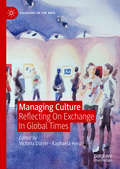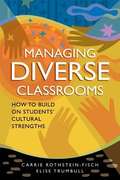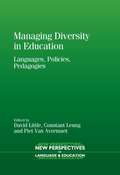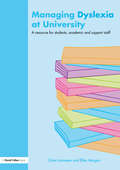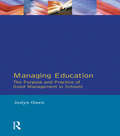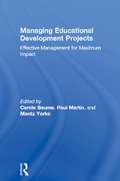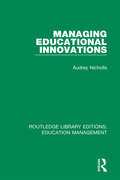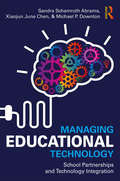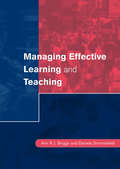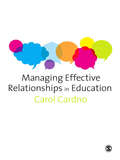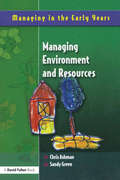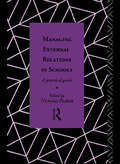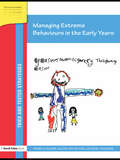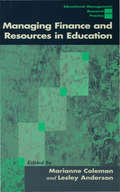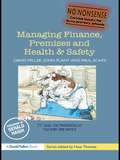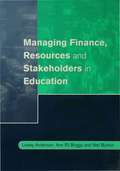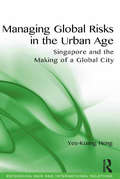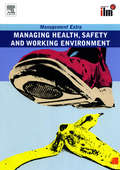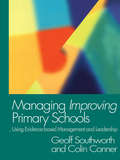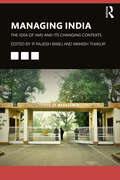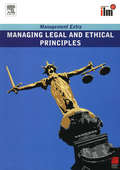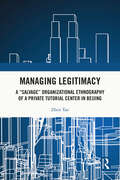- Table View
- List View
Managing Culture: Reflecting On Exchange In Global Times (Sociology of the Arts)
by Raphaela Henze Victoria DurrerThis book provides new insights into the relationship of the field of arts and cultural management and cultural rights on a global scale.Globalisation and internationalisation have facilitated new forms for exchange between individuals, professions, groups, localities and nations in arts and cultural management. Such exchanges take place through the devising, programming, exhibition, staging, marketing, and administration of project activities. They also take place through teaching and learning within higher education and cultural institutions, which are now internationalised practices themselves. With a focus on the fine, visual and performing arts, the book positions arts and cultural management educators and practitioners as active agents whose decisions, actions and interactions represent how we, as a society, approach, relate to, and understand ourselves and others. This consideration of education and practice as socialisation processes with global, political and social implications will be an invaluable resource to academics, practitioners and students engaging in arts and cultural management, cultural policy, cultural sociology, global and postcolonial studies.
Managing Discipline in Schools
by Sonia BlandfordThe management of discipline is an essential element in educational practice, and at a time when teachers and managers are anxious about reported increases in violence and other forms of anti-social behaviour there's a need for practical guidance and a review of current thinking. Based on the author's experience and research in a range of secondary and primary schools, this book presents accessible summaries of relevant legislation and guides the reader through management theories towards effective practice. By placing the teacher at the centre of the management of discipline in schools and focusing on teacher and pupil esteem, a disciplined environment is not only desirable, but achievable too. Written in an accessible style, the book; * highlights the real problems and offers real solutions * includes case-studies, recent research and legislation * considers the classroom as well as the whole-school context * describes the support networks within education * provides a multi-agency approach. This book is aimed at trainee and practising teachers, managers, and all those who work with children.
Managing Diverse Classrooms: How to Build on Students' Cultural Strengths
by Carrie Rothstein Fisch Elise TrumbullThe authors present a simple framework for understanding cultural differences, comparing the "individualistic" culture that prevails in American education with the "collectivistic" culture that characterizes most of the world's population, including many of the Latino immigrant students in U.S. classrooms.
Managing Diversity in Education
by David Little Constant LeungDiversity - social, cultural, linguistic and ethnic - poses a challenge to all educational systems. Some authorities, schools and teachers look upon it as a problem, an obstacle to the achievement of national educational goals, while for others it offers new opportunities. Successive PISA reports have laid bare the relative lack of success in addressing the needs of diverse school populations and helping children develop the competences they need to succeed in society. The book is divided into three parts that deal in turn with policy and its implications, pedagogical practice, and responses to the challenge of diversity that go beyond the language of schooling. This volume features the latest research from eight different countries, and will appeal to anyone involved in the educational integration of immigrant children and adolescents.
Managing Dyslexia at University: A Resource for Students, Academic and Support Staff
by Ellen Morgan Claire JamiesonA thorough and comprehensive guide for both education professionals and those affected by dyslexia, this book is predominantly a guidebook. It includes lots of practical advice and is based on the authors’ sound knowledge of current theory and practice. It includes: photocopiable materials contact and reference details personal organisation advice ways forward for potential problems information on secondary or associated difficulties.
Managing Early Years Settings: Supporting and Leading Teams
by Mrs Alison Robins Ms Sue Callan'This book is a very useful resource for setting leaders undertaking advanced study, such as Early Years Professional Status and the National Professional Qualification in Integrated Centre Leadership...[I]t is also an interesting and up-to-date reference tool for qualified managers and leaders of early years settings, large and small, in all sectors' - Early Years Update 'Through discussion points and case studies, the authors explore the key skills and techniques necessary to effectively lead and manage an early years setting - Nursery Education Plus, as part of their 'Ten of the Best early years professional books' feature. `This book will make a relevant and helpful contribution in enabling practitioners to explore and understand the different ways in which they can lead and manage across a diverse range of settings and at different levels. Through helpful discussion points and case studies, the book will encourage practitioners to consider both theory and practice, including value based practice and the skills required for working within a new multi-disciplinary environment. A welcome and accessible text for early years practitioners facing the challenges and demands of this new agenda' - Professor Linda Miller, Professor of Early Years, The Open University Firmly grounded in practice, this book puts children and families at the centre of good early years leadership. There is now considerable emphasis on leadership skills in this sector, as the workforce becomes increasingly professionalized. The following are considered: - changes and developments within the early years sector - the impact of good leadership on children and their families - effective practice in a variety of settings, including Children's Centres - value-based leadership, and inspirational leadership - meeting the challenges - managing change - inter-agency and multi-disciplinary working - working with families and parent groups. Useful features such as Activities for Continuing Professional Development, Questions for Reflection and Pictures of Practice appear throughout the book. Those studying for Foundation Degrees, leaders undertaking the National Professional Qualification for Integrated Centre Leadership (NPQICL), those undertaking the management modules for Early Years Professional Status (EYPS) and anyone studying Childhood and Early Childhood will find this book an invaluable aid.
Managing Education: The Purpose and Practice of Good Management in Schools
by Joslyn OwenThe 1988 Education Reform Act meant that schools had to manage themselves in ways which satisfied the world outside the school gates. Governors become more powerful, parents took on a greater influence and employers were given new rights. This book discusses the total management of schools as they respond to these new imperatives. It examines the responsibilities of Teachers, Head Teachers and Principals as they shape and execute their management plans. Against the background of a compulsory National Curriculum, the book also examines the management of the diverse pressures within the curriculum itself.
Managing Educational Development Projects: Effective Management for Maximum Impact (SEDA Series)
by Paul Martin Mantz Yorke Carole BaumeEducational development is a major issue for higher education institutions (HEIs). It constitutes a major part of the research work of many academics. This practical volume, written by experienced practitioners in the field, is a guide to successfully managing an educational development project.
Managing Educational Innovations (Routledge Library Editions: Education Management #17)
by Audrey NichollsOriginally published in 1983. This book deals with theories of innovation and activities of innovating and the relationships between them, and will help to clarify some of the underlying theories and enable practitioners to make a more professional response to the demands and pressures for innovation. The book analyses some case studies of educational innovations carried out on both sides of the Atlantic and suggests what lessons might be learned from them. It stresses the importance of the active involvement of teachers in the decision-making process and emphasises the importance of a rigorous and broadly based evaluation of innovation. The controversial issue of the use of external consultants in schools is discussed. Written in a clear style, free from jargon, theories are not discussed in isolation or for their own sake, but are applied and related to educational practice.
Managing Educational Technology: School Partnerships and Technology Integration
by Sandra Schamroth Abrams Xiaojun June Chen Michael P. DowntonManaging Educational Technology: School Partnerships and Technology Integration by Sandra Schamroth Abrams, Xiaojun June Chen, and Michael P. Downton. Sandra Schamroth Abrams is an associate professor in the Department of Curriculum and Instruction at St. John’s University, USA. Xiaojun Chen is an associate professor of educational technologies in the Department of Curriculum and Instruction at St. John’s University, USA. Michael P. Downton is an assistant professor in the Department of Curriculum and Instruction at St. John’s University, USA.
Managing Effective Learning and Teaching (Educational Management Research and Practice Series)
by Ann Briggs Daniela SommefeldtPresenting the theory underlying management of teaching and learning, as well as discussion of good practice in schools and colleges, the authors of this volume discuss the rationale for learning and teaching though a consideration of curriculum design. This is linked to models of learning and teaching, and the management of contexts for learning, together with the roles and responsibilities of curriculum managers. Examples are drawn from international settings as well as from the United Kingdom, encouraging the reader to explore the context of managing learning and teaching within his/her own institution. The authors provide self-study material, with extensive links to other key texts in the field. This book is a valuable source book for curriculum managers at all levels in schools and colleges, as well as a course book for Masters' level study in educational management
Managing Effective Relationships in Education
by Ms Carol Cardno'This is an important book and essential reading for all leaders in education. Carol Cardno expertly shows how effectiveness can be enhanced when complex problems are openly, collaboratively and trustingly resolved. This book offers a refreshing insight into the complexities of being a leader and exercising effective leadership in modernised organisations'-Professor Tanya Fitzgerald, La Trobe University, Melbourne Combining a theoretical and a practical approach, this book provides a guide to educational administration, management and leadership across sectors. The author focuses on two particular topics: organisational learning and dilemma management. More specifically, the author looks at how to bring about productive relationships in order to solve complex problems. By drawing attention to particular sets of theory and practice, Cardno presents seminal and recent research that can be applied to practice in an original way. The author demonstrates that effectiveness is enhanced when complex problems are resolved collaboratively and trustingly. Productive relationships are shown to rely on openness and dialogue. This book will stimulate and support practising and aspiring educational leaders at all levels and in all types of educational organisations. Students, practitioners and researchers in the early childhood, school and tertiary sectors will find this book to be indispensable. Dr Carol Cardno is Professor of Educational Management and until recently was Head of the School of Education at Unitec Institute of Technology. She has held several school management positions and was principal of Waitakere College before establishing an Educational Management Centre at Unitec in 1991.
Managing Environment and Resources (Managing in the Early Years)
by Sandy Green Chris AshmanMaking management ideas easy to grasp and providing practical advice on management theory and practice, this book focuses on how to make policy work in practice: providing comprehensive advice on managing resources including advice on Health & Safety and promoting a healthy environment clear explanations of how to measure cost, incomes, ratios and effective efficiency Suggestions on how to bring about change and improvement.
Managing External Relations in Schools: A Practical Guide (Educational Management Ser.)
by Nicholas FoskettThe educational environment of the 1990's is characterized by increasing independence for schools in a more competitive climate. This book is intended to be of direct practical help to those involved in ensuring the long-term wellbeing of schools for the benefit of the pupils they educate. Its aim is to provide both an overview of the issues relating to external relations in schools and an insight into the organizational and planning systems that can be applied to dealing with them. In particular it focuses on the overall field of external relations and on its individual facets, ranging from the management of links with the LEA, liaison with parents and issues in primary/secondary school links to school identity and marketing. The book is divided into four integrated parts which examine approaches to the management of external relations, links with the educational environment, links with the community, and external relations. Managing External Relations in Schools places the new challenges arising from the Education Reform Act and LMS into a broad context, which is much wider than the common concept of public relations and marketing. This will enable teachers and school managers to consider more systematically the management needs of the institution's external links. Each of the contributors is an expert in his or own field and has written from the perspective of real challenges and issues facing schools. Ideas on enhancing efficiency and effectiveness in all spheres of external relations underpin the themes in the book.
Managing Extreme Behaviours in the Early Years (Tried and Tested Strategies)
by Angela Glenn Jacquie Cousins Alicia HelpsIncreasing numbers of children attending pre school provision have led to increasing referrals to the advisory services for behavioural issues. Children appear to be having difficulty conforming to social expectations in educational settings and are presenting us with more extreme behaviours. In spite of much advice already available in the form of written material, books and TV programmes there appears to be an increase in behaviours reported and in practitioners searching for managing strategies. The suggested strategies are based upon long, varied experiences in real life situations and have a grounding in practice, designed to be manageable, realistic and relevant to educational settings. They cover the following behaviours: Self harm Hitting Running away Sexualised behaviour Refusal to talk Uncooperative behaviour Aggressive behaviour Managing Extreme Behaviours in the Early Years, the fifth of the Tried and Tested Strategies series, is a ready-to-hand and easy to read guide for those dealing with problem behaviour and who do not always have the time to search for solutions.
Managing Finance and Resources in Education (Centre for Educational Leadership and Management #4)
by Dr Marianne Coleman Dr Lesley Anderson`The book provides an excellent wide and stimulating set of readings and would be useful to anyone taking forward Unit 3 or the Accelerated Route of SQH' - SQH Newsletter `This is a useful addition to the literature on finance and resource management in education.... Those whose work involves managing resources and finance in schools and colleges will find this a useful or even indispensable addition to their bookshelves, whether they are heads, principals or middle managers' - Mentoring and Tutoring This book will provide readers with knowledge and understanding of the theory and practice of managing finance, resources and stakeholders in schools and colleges. Written specifically for those studying for an academic qualification at Masters level in educational management, it provides self-study material and links to other key texts in the field. The authors deal with the links between finance, resources and stakeholders in the context of school and college self-management. Examples are drawn from international settings as well as from the United Kingdom. Building on an examination of theoretical perspectives, practical considerations and applications are examined in a format which encourages the reader to explore the context of their own educational institution. This book is a core text for the University of Leicester MBA in Educational Management.
Managing Finance, Premises and Health & Safety (No-Nonsense Series)
by David Miller John Plant Paul ScaifeThis book covers the most important aspects of these essential issues, such as: how and when to budget how to audit your school's facilities how to manage, maintain and improve your premises ways to gain extra funding for your premises what are the main Health and Safety issues, what are the common pitfalls, and what are the policies you really need.
Managing Finance, Resources and Stakeholders in Education (Centre for Educational Leadership and Management)
by Neil Burton Ann Briggs Lesley Anderson`The text is challenging and stimulating and structured to provide the reader with an accessible synopsis of the range of current trends and solutions in the area of educational financial management being applied in the UK and the global context′ - Improving Schools Managing Finance, Resources and Stakeholders in Education provides readers with knowledge and understanding of the theory and practice of managing finance, resources and stakeholders in schools and colleges. Written specifically for those studying for an academic qualification at masters level in educational management, it provides self-study material and links to other key texts in the field. The authors deal with the links between finance, resources and stakeholders in the context of school and college self-management. Examples are drawn from international settings as well as from the United Kingdom. Building on an examination of theoretical perspectives, practical considerations and applications are examined in a format, which encourages the reader to explore the context of their own educational institution.
Managing Global Risks in the Urban Age: Singapore and the Making of a Global City (Rethinking Asia and International Relations)
by Yee-Kuang HengThe first full-length exposition of what it terms a global city-global risks nexus, this volume crosses disciplinary boundaries to draw upon research from Security Studies; Geography; Sociology; and Urban Studies. Innovative in its approach integrating theories about Global Cities with those positing a Global Risk Society, Yee-Kuang Heng positions this research in the midst of two concurrent global trends that will gain more significance in coming years. The world is experiencing the consequences of not only rapid globalisation, but also urbanization. In 2008, the UN declared that more than half the world’s population was now urban. At the same time, highly connected global cities like New York, London, Tokyo and Singapore also face rapidly spreading global risks such as pandemics and financial crises. Unique in developing a typology of global risks that threaten a global city like Singapore, beyond its Asian focus, the book also draws out thematic and policy lessons pertinent to other global cities. ’Global cities’ do not simply materialize. They are dependent on a range of stakeholders at various levels that produce and re-produce its command and control capabilities, in the face of global risks. Singapore’s experiences managing global risks in the financial; aviation; and maritime domains are common concerns shared by many countries and cities that have, or aspire to develop, similar critical infrastructure.
Managing Health, Safety and Working Environment Revised Edition: Revised Edition (Management Extra Ser.)
by ElearnStuck for ideas, inspiration or just want to work differently? Management Extra brings all the best management thinking together in one package. The books are practical and well structured to provide an in depth treatment of these management topics. Titles in the series: * Business Environment * Change Management * Development for High Performance * Effective Communications * Financial Management * Information and Knowledge Management * Leadership and Management in Organisations * Leading Teams * Making Sense of Data and Information * Managing Markets and Customers * Managing for Results * Managing Health, Safety and Working Environment * Managing Legal and Ethical Principles * Managing Yourself * Positive Working Relationships * Project Management * Quality and Operations Management * Reaching Your Goals Through Innovation * Recruitment and Selection * Reputation Management The series fuses key theories and concepts with applied activities to help managers examine how they work in practice. The books are created with individuals in mind. They are designed to help you improve your management skills. Management Extra can also be used in conjunction with management programmes of study aligned to standards. Each of the books has case studies, self assessments and activities all underpinned by knowledge and understanding of the frameworks and techniques required to improve performance. Management Extra provides managers and trainers with a handbook for action and development. "You found it – what a find! A practical resource packed with all the relevant theory and suggested activities to support your professional development. An essential resource to have at your fingertips, jump in and enjoy."--Russell Jeans, Learning and Development Manager, ntl "All the essential concepts are here, presented in an easily digestible format with lots of up to date case studies and references – but, most importantly, with plenty of thought provoking activities and self-diagnostic exercises to make the learning personal and transferable."--Peter Manning, Head of Training & Development, News International Newspapers Ltd
Managing Improving Primary Schools: Using Evidence-based Management
by Geoff Southworth Colin ConnerA practical handbook which senior staff in primary schools can use to support their activities in evidence-based management. There is increased emphasis on teachers monitoring the quality of teaching and learning, the Teacher Training Agency's direction is towards teaching as a research-based profession, and there is greater need to assess learning gains and evaluate year-on-year progress in schools. For headteachers, deputy heads, managers, Key Stage coordinators and subject coordinators this book will provide the guidance they need to conduct and act upon quality reviews and evidence- based analyses of pupils' learning and the quality of teaching.
Managing India: The Idea of IIMs and its Changing Contexts
by R Rajesh Babu and Manish ThakurThis book explores the history and metamorphosis of the Indian Institutes of Management (IIMs), the premier business and management schools in India, and their significance within the changing landscape of higher education, nation-building and socio-economic development in the country. Over the past decades, IIMs, as institutions, have recalibrated their goals and priorities to address contemporary challenges in a globalised world, changing aspirations of a rapidly growing population and the changing idea of India. This book examines different facets of the challenges the institutes have faced in the aftermath of independence. These include the challenges of effective institutional governance; ensuring equity and access; democratisation; raising the bar for teaching and research; addressing national imparities and global benchmarking; accreditation and ranking; and academia, industry, and employability. Drawing upon the interplay of the experiential and analytical, the contributors to the volume also engage with the Indian knowledge system and the contested terrain of global theory and research. This volume will be of interest to scholars, researchers and practitioners of education, management studies, academic administration, and policymaking in the field of higher education.
Managing International Schools
by Sonia Blandford Marian ShawIt is estimated that there are some 12 000 international schools world-wide, with over 25 000 middle managers and head teachers. Within this there are several different types of international school including British schools abroad, English-speaking schools overseas, European English-speaking schools and forces schools - in spite of some differences they and their managers share certain needs for administrative efficiency. This practice-based management book for international schools provides support and development for middle and senior managers and teachers. The book concentrates on school improvement and effectiveness by drawing on best practice from international schools around the world using school-based research.It is written by a team from the Oxford Brookes Centre for Educational Management (OXCEM), the UK's most active International Schools' consultancy service. Issues discussed include teaching, learning and the curriculum, primary and secondary curriculum development, recording and reporting assessment, English as a second language, school management and staff development.
Managing Legal and Ethical Principles Revised Edition
by ElearnStuck for ideas, inspiration or just want to work differently? Management Extra brings all the best management thinking together in one package. The books are practical and well structured to provide an in depth treatment of these management topics. Titles in the series: * Business Environment * Change Management * Development for High Performance * Effective Communications * Financial Management * Information and Knowledge Management * Leadership and Management in Organisations * Leading Teams * Making Sense of Data and Information * Managing Markets and Customers * Managing for Results * Managing Health, Safety and Working Environment * Managing Legal and Ethical Principles * Managing Yourself * Positive Working Relationships * Project Management * Quality and Operations Management * Reaching Your Goals Through Innovation * Recruitment and Selection * Reputation Management The series fuses key theories and concepts with applied activities to help managers examine how they work in practice. The books are created with individuals in mind. They are designed to help you improve your management skills. Management Extra can also be used in conjunction with management programmes of study aligned to standards. Each of the books has case studies, self assessments and activities all underpinned by knowledge and understanding of the frameworks and techniques required to improve performance. Management Extra provides managers and trainers with a handbook for action and development. "You found it – what a find! A practical resource packed with all the relevant theory and suggested activities to support your professional development. An essential resource to have at your fingertips, jump in and enjoy."--Russell Jeans, Learning and Development Manager, ntl "All the essential concepts are here, presented in an easily digestible format with lots of up to date case studies and references – but, most importantly, with plenty of thought provoking activities and self-diagnostic exercises to make the learning personal and transferable."--Peter Manning, Head of Training & Development, News International Newspapers Ltd
Managing Legitimacy: A “Salvage” Organizational Ethnography of a Private Tutorial Center in Beijing
by Zhen TaoFrom an out-of-school perspective, the book studies private supplementary tutoring, also widely known as shadow education within the Chinese education landscape.The author presents an organizational ethnography of Smart English, a private English tutoring center in Beijing. Using the concept of “organizational legitimacy” from organizational institutionalism as its framework, the study provides a detailed account of the center’s daily operations. It examines how the organization manages its legitimacy while navigating regulations, providing private supplementary tutoring, and addressing public skepticism. The book documents the typical operations of such institutions in Chinese mainland before stringent regulations disrupted their activities, serving as a “salvage” record.This book enriches educational ethnographies and will appeal to academics of shadow education, Chinese education, and ethnography.
